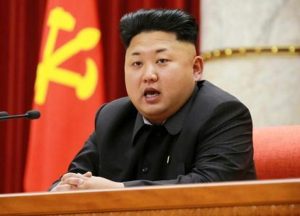
Following yesterday’s announcement by South Korea that they suspected that North Korea had detonated a nuclear device, North Korea told the world today that they had, in fact, detonated their largest nuclear device to date.
North Korea did not notify the international community in advance of yesterday’s test which marked North Korea’s 68th anniversary of the founding of that country.
The test carried out yesterday, is the fifth detonation since 2006, and the second this year. This most recent detonation was estimated to be in the 10-kiloton range, nearly twice the strength of the detonation in January. That estimate falls short of the 15-kiloton detonation that leveled Hiroshima at the end of World War II. However, Jeffery Lewis, with the Middlebury Institute of International Studies stated that the 5.3 earthquake generated by the blast was of the magnitude generated by a nuclear device in the 20 to 30-kiloton range.
The U.S.-Korea Institute at Johns Hopkins School of Advanced International Studies estimates that North Korea has enough plutonium and highly enriched uranium to build from 10 to 16 nuclear bombs.[xyz-ihs snippet=”adsense-body-ad”]North Korea’s state television station, KCNA read an announcement from the DPRK saying that North Korea now has the capability to miniaturize their nuclear devices to now fit on their various types of ballistic missiles. During that announcement KCNA stated, “This nuclear warhead explosion test is part of responsive measures to threats and sanctions from the U.S. and enemies denying our strategic position as a nuclear state.”
The United Nations imposed harsh new sanctions against North Korea in March of this year for its violations of Security Council resolutions that banned North Korea’s development of nuclear devices and ballistic missiles. But, those sanctions have had little effect in detouring the DPRK from doing so, they have launched 20 short to medium range missiles since those sanctions were imposed.
North Korea fired three ballistic missiles as recently as Monday into Japan’s Air Defense Zone in the Sea of Japan.
This latest detonation again sparked reactions from the international community.
South Korea’s President, Park Geun-hye condemned this latest detonation and said from Laos where Park is attending the ASEAN Summit, that this detonation, “proves Kim Jong Un’s rabid recklessness to cling to nuclear development.” Park intends to leave the summit early in order to return to South Korea to monitor the incident.
Hwang Gyo-ahn says that in response to the bomb test, South Korea will call on the U.N. for stronger sanctions against their neighbor to the north. In a statement, Hwang said, “We are facing a grave situation which is totally different from the past when North Korea conducted nuclear tests once in three years. North Korea’s nuclear and missile threats are clear and existential.”
U.S. Secretary of State John Kerry, who is in Geneva meeting with Russian diplomat Sergei Lavrov said, “We are very much concerned and the resolutions of the Security Council must be implemented and we will send this message very strongly.”
Meanwhile in China, where Chinese officials believe that stiffer sanctions will only serve to de-stabilize the North Korean government, Spokeswoman for Chinese Ministry of Foreign Affairs said that her country “strongly” urges North Korea “to honor its commitment to de-nuclearization, comply with the relevant Security Council resolutions, and to stop taking any action that worsens the situation.”[xyz-ihs snippet=”Adversal-468×60”]
